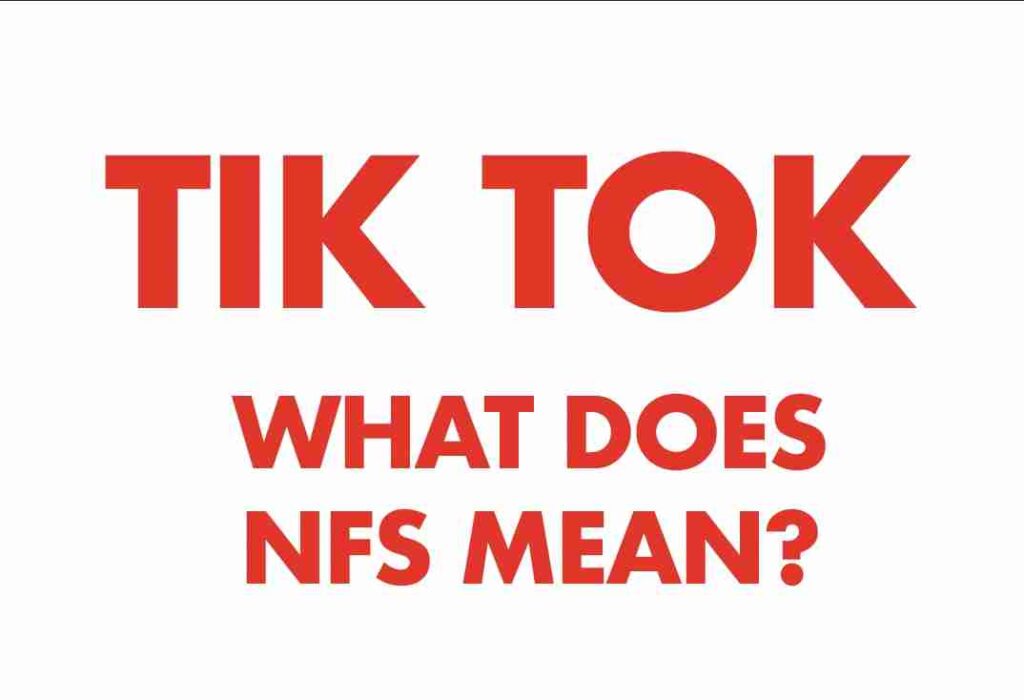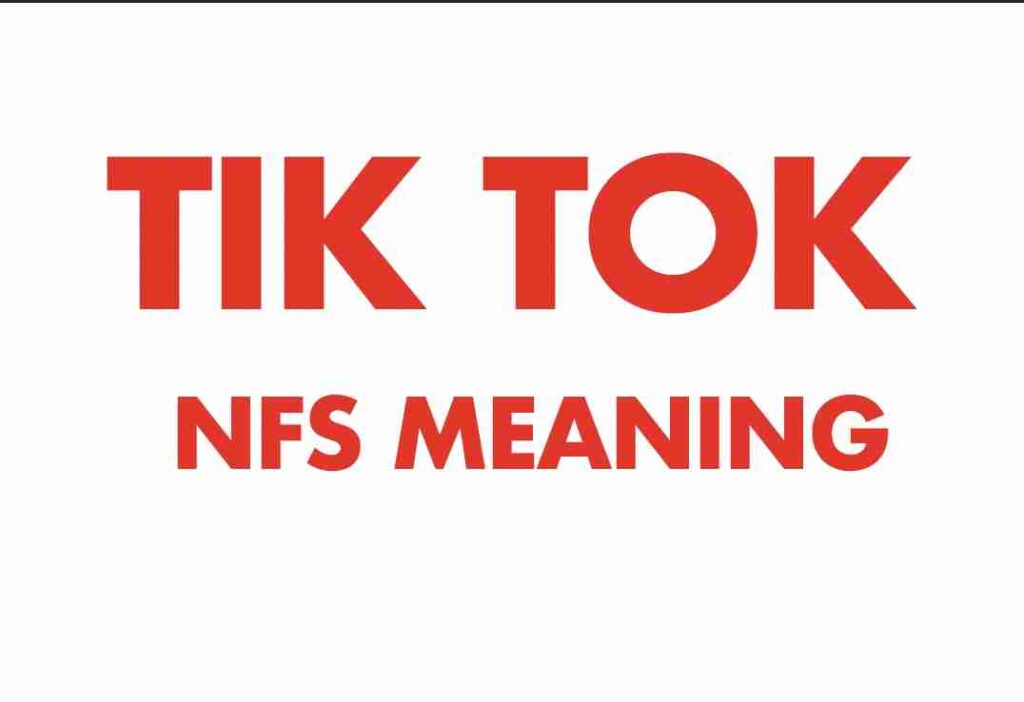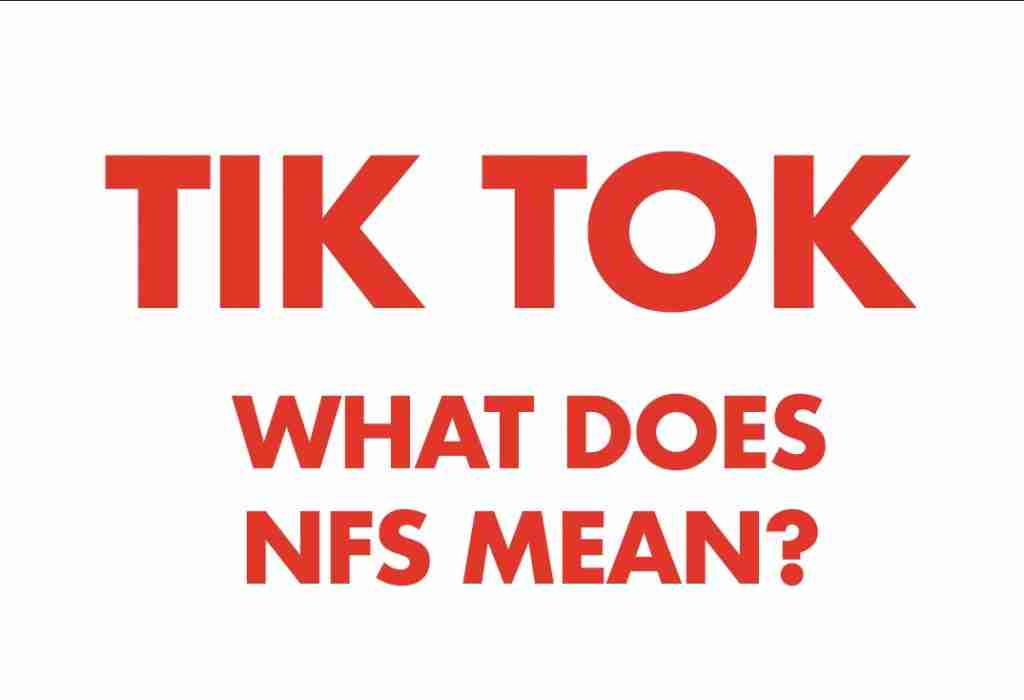TikTok is not just a hub of dance challenges and viral trends; it’s also home to a unique set of acronyms and slangs. One of these catchy acronyms is “NFS.” What does NFS mean on Tik Tok?
What does NFS mean on Tik Tok?
Decoding TikTok’s “NFS”: A Guide to its Origins and Usage

Introduction:
What does NFS mean on TikTok?
“NFS” stands for “No Funny Shit.” It is used on TikTok to emphasize the seriousness or authenticity of a statement, ensuring that the message is received without any humorous connotation.
Usage in Different Contexts (What does NFS mean on TikTok?)
:
- Emphasizing Sincerity:
- Example: “NFS, I just saw a UFO in my backyard.”
- Translation: “I’m not joking, I genuinely just saw a UFO in my backyard.”
- Clarifying Truthfulness:
- Example:
- Question: “Did you really get a free meal at that restaurant?”
- Answer: “Yeah, NFS.”
- Translation: “Yes, I’m telling the truth.”
- Example:
- Highlighting the Unexpected:
- Example: “The professor actually extended the deadline, NFS.”
- Translation: “Believe it or not, the professor genuinely extended the deadline.”

Origin of “NFS”:
This slang originated from the streets of New York. Over time, amusing videos and interviews featuring this term started to circulate online. The phrase quickly transitioned from local slang to a widely recognized internet acronym.
NFS on TikTok: Notable Examples
- Emphasizing Serious Topics:
TikToker shortyloveray used NFS to introduce a serious topic: the need for an Apple emoji representing tall individuals. - Breaking Down “NFS”:
Another creator, Lena Rants, humorously delved into the multifaceted meanings of NFS. She expressed confusion over its various interpretations: “new friends,” “no funny shit,” or “no fuckin shit.”
Conclusion:
Understanding TikTok lingo can sometimes be tricky, but with the rise of “NFS,” it’s essential to grasp its context to determine its intended meaning. Whether someone is emphasizing a statement’s truthfulness or introducing a serious topic humorously, “NFS” has undoubtedly secured its place in the ever-evolving TikTok vocabulary.
Delving Deeper into the Evolution of TikTok Lingo
A Brief Overview:
TikTok has undeniably reshaped the social media landscape. Its swift rise to global popularity is not only credited to its engaging short-form video content but also its dynamic and evolving language. Acronyms like “NFS” are just the tip of the iceberg. Let’s take a comprehensive look at the origins, usage, and impact of TikTok’s unique lingo.
The Genesis of TikTok Lingo:
Internet Culture Meets Real Life:
The internet has always been a breeding ground for new phrases and acronyms. When TikTok emerged, it provided a platform where internet culture could blend seamlessly with everyday life, leading to the rapid evolution of its own exclusive lingo.
Viral Trends & Challenges:
A significant chunk of TikTok terminologies can trace their origins back to specific trends or challenges that went viral. For instance, terms like “Bussin'” or “Sheesh” skyrocketed in popularity because of trends associated with them.
Global Influence:
TikTok’s global user base means that slangs and phrases from one corner of the world can quickly become global phenomena. Terms like “Cheugy,” which originated in the U.S., soon found resonance among users worldwide.
Deciphering TikTok Phrases:
“Main Character Syndrome”:
Ever felt like you’re the protagonist in your own movie? TikTokers have coined this feeling as having the “Main Character Syndrome.” It’s about being the star of your narrative, often used humorously or mockingly.
“It’s the _ for me”:
This phrase is a trendy way to pinpoint specifics. For instance, “It’s the dedication for me” can be a compliment, while “It’s the attitude for me” might be a playful jab.
“FYP (For Your Page)”:
FYP refers to TikTok’s main feed. When creators hope their content gets widespread visibility, they might use the hashtag #FYP.
Impact on Broader Pop Culture:
TikTok has revived old tracks and propelled them to the top of the charts (think “Dreams” by Fleetwood Mac). But the app’s lingo has also played a role. Lyrics now sometimes incorporate popular TikTok terms to resonate with the younger audience.
Fashion & Retail:
With the “Buss it” challenge, for instance, came a surge in demand for transformational outfits. Moreover, terms like “Cheugy” have influenced fashion critiques and retail strategies.
It’s not uncommon to hear someone drop a “No cap” (meaning no lie) or “That’s sus” (meaning that’s suspicious) in day-to-day discussions. TikTok lingo is permeating real-life conversations, especially among Gen Z.
The Potential Pitfalls:
Misunderstandings:
The fluidity of internet language means that a term on TikTok might mean something entirely different elsewhere. This disparity can lead to misunderstandings, especially for those not in the loop.
Overuse & Saturation:
Overreliance on trendy terms can lead to saturation. What’s “lit” today might be considered “cheugy” tomorrow. Brands, in particular, should tread carefully to avoid seeming out of touch.
Looking Ahead: What does NFS mean on TikTok?
As TikTok continues to evolve, so will its language. The platform will undoubtedly keep generating new phrases, memes, and acronyms that reflect the times and the sentiments of its users. It’s a reflection of the digital age: dynamic, global, and ever-changing.
For those looking to stay updated, it’s about more than just knowing the terms. It’s about understanding the culture, context, and emotions behind them. In a way, TikTok is not just a social media platform; it’s a linguistic phenomenon in its own right.

